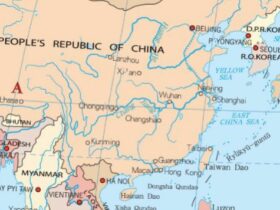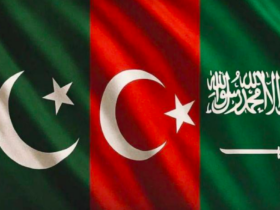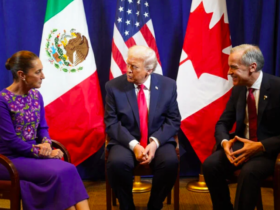Reactions to and background of the recent Israeli attack on Qatar.
Reactions to and background of the recent Israeli attack on Qatar.
By Mohammad Sabreen, from Cairo / Egypt
The Gulf states appear to be in a state of shock following Israel’s aggression against Qatar. They have begun a profound process of reconsidering their view of the occupying state and reviewing their ideas regarding normalization. They have reached a preliminary conviction that they may have gone too far in their delusions regarding Israel’s integration into the region. Perhaps the Qatari leadership’s assessment of the danger of the apartheid regime is the most severe. With great astonishment, Qatari Prime Minister Sheikh Mohammed bin Abdulrahman Al Thani explained that Netanyahu had said he would change the face of the Middle East, and asked, “Will he change the Gulf region?”.
This question reveals a violent awakening in the Gulf regarding Israel’s intentions, the threat it faces, and the meaninglessness of any talk about any good opportunities arising from normalization with Israel. At the present moment, relations with the occupying state are being reconsidered. On the other hand, the aggression against Qatar and the regional developments following the war in Gaza will reshape the political context and place the future of normalization at risk.
A Message to the Entire Region
Sheikh Mohammed bin Abdulrahman Al Thani, Prime Minister and Minister of Foreign Affairs of Qatar, described the Israeli attack on Doha as “political turmoil,” describing it as “state terrorism,” an attempt to destabilize regional security and stability, and a message to the region that there is a rogue actor in the region.
During a press conference following the Israeli attack on Tuesday, the Qatari Prime Minister said that Israeli Prime Minister Benjamin Netanyahu is leading the Middle East to an irreversible level, and his policies to destabilize regional security are a message to the entire region.
He added that the Israeli Prime Minister threatened to change the face of the Middle East, asking, “Will he change the Gulf region?” He continued, “Israel’s actions must not be overlooked, and all measures must be taken against it, and a unified response must be made to Netanyahu’s barbarism.”
Sheikh Mohammed bin Abdulrahman asserted that the attack on Qatari territory was “treacherous” and sabotaged all attempts and opportunities for peace, denying his country’s prior knowledge of it. He said, “The United States informed us 10 minutes after it was carried out, and Israel used weapons that could not be detected.”
This comes after the map of relations between some Gulf states and Israel had shifted as a result of strategic, economic, and security factors over the past decade, most notably concerns about Iran and the need for new technologies and investments. However, this shift is not uniform: there is a clear contrast between the relatively open positions of the UAE and Bahrain and the more conservative position of Saudi Arabia, while Qatar and Oman continue to adopt intermediate or independent positions.
Strategic Orientation
Some Gulf states previously viewed rapprochement with Israel as an opportunity to achieve practical goals, such as security partnerships to counter Iranian influence, intelligence cooperation, and access to Israeli technology in the fields of energy, agriculture, and artificial intelligence. In practice, economic and trade projects have become a priority for Gulf decision-makers, but this priority has been subject to political constraints. Public action is now measured by a balance between practical gains and domestic sensitivity regarding the Palestinian issue.
Different Positions Among the Gulf States
The UAE and Bahrain were among the first countries to join the Abraham Accords, pushing for formal and economically fruitful relations. However, the crisis in Gaza has demonstrated a willingness to freeze or renegotiate some areas of cooperation if popular and political pressure escalates.
Saudi Arabia remains the most conservative; its official position links any formal normalization to tangible progress on the two-state solution or guarantees for the Palestinians. Riyadh also uses the normalization issue as a bargaining chip against the United States and Israel to secure regional and political guarantees. Both Qatar and Oman have opted for a mediating policy based on diplomatic mediation and maintaining channels of communication with various factions, while avoiding full normalization that would provoke domestic reactions. Qatar’s role as a mediator on issues such as prisoner exchanges and ceasefire arrangements has made its position unique.
The War Against Gaza and Iran
The war against Gaza, Iran, and Tehran’s allies changed the “context” of normalization initiatives. On the one hand, the Abraham Accords remained technically and economically feasible, while on the other hand, expanding their scope, especially with Saudi Arabia, remained difficult unless clear political steps were taken toward the Palestinians or guarantees were provided to halt violations. Restrictions on trust in the ability of the international guarantor, the United States, also prompted some Gulf states to reconsider their investment balances and security alliances.
Gains and Risks
Some American research centers attempted to promote some benefits for the Gulf, such as accelerating economic transformation, diversifying the economy, investing in technology and cybersecurity, deepening defense cooperation against regional threats, and attracting new international networks.
On the other hand, the leadership of the Gulf states was aware of the risks of normalization, most notably popular resistance that could affect the internal legitimacy of political plans, the possibility of relations being frozen or setbacks in the event of a military escalation in the Palestinian territories, and the possibility that some normalizing states would be viewed as parties far removed from the Palestinian cause, thus affecting their regional role.
On the other hand, the leadership of the Gulf states was aware of the risks of normalization, most notably popular resistance that could affect the internal legitimacy of political plans, the possibility of relations stagnate or suffer setbacks in the event of a military escalation in the Palestinian territories, and the possibility that any normalizing state would be viewed as a party far removed from the Palestinian cause, thus affecting its regional role.
Despite all this, the American Carnegie Endowment for International Peace made several recommendations to justify the normalization process, most notably linking progress in normalization to measurable criteria for resolving the Palestinian issue. The Carnegie Endowment calls for linking any progress toward Israel to clear political progress on the Palestinian track to minimize domestic backlash.
At the same time, American experts call for maintaining flexible security and intelligence communication channels with Israel, citing the existence of common regional threats (Iran and the militias). They recommend maintaining security coordination, but ensuring it is embedded within a political-diplomatic framework.
The American prescription includes accompanying economic packages to mitigate popular repercussions, by offering development and economic projects for the Palestinians or to support regional stability, to demonstrate the benefits of normalization. Carnegie experts advocate a phased and gradual strategy, not an all-out attempt at normalization at once. Instead, they advocate measurable steps and joint review mechanisms that allow for a freeze or expansion based on progress in the political solution.
Red Line
A senior Emirati official has warned Israel that annexing the West Bank would be a red line that would end the vision of regional integration and undermine any chance of lasting peace.
Just two days before Israeli Prime Minister Benjamin Netanyahu was set to hold ministerial consultations on moving forward with the controversial move, UAE Assistant Foreign Minister for Political Affairs Lana Nusseibeh told The Times of Israel that “annexation would be a red line for my government. It means there can be no lasting peace, it would shut down the idea of regional integration, and it would spell the end of the two-state solution.”
Nusseibeh sent an indirect message to the administration of US President Donald Trump, emphasizing the UAE’s confidence that the US president would not allow the legacy of the Abraham Accords to be undermined. She emphasized that “we believe that President Trump and his administration have many tools to lead the initiative toward broader Israeli integration in the region.” The Emirati official, who previously served as her country’s ambassador to the United Nations, emphasized that “annexation would be considered a de facto rejection of the Abraham Accords,” emphasizing that this option must be presented to the Israeli people themselves.
While Nusseibeh explained what Israel stands to lose if it proceeds with annexation, she was also careful to highlight what it stands to gain if it abandons this plan.
She stated that Arab countries, including Saudi Arabia, remain open to normalization, but only if Israel withdraws its annexation plans and accepts a serious and irreversible path toward establishing a Palestinian state. Nusseibeh explained that “the idea of regional integration is still on the table in Arab capitals, but annexation to appease hardline elements in Israel would take this idea out of the equation.” She emphasized that Abu Dhabi did not arrive at this conviction lightly. She said, “Over the past two years, our position has remained that the vision of the Abraham Accords remains valid, and that extremists cannot be allowed to determine the course of the region.”
However, she warned that Israel’s escalating steps to consolidate its presence in the West Bank and Gaza are pushing the region toward a point of no return. Nusseibeh concluded by affirming that “the principles of the Abraham Accords regarding prosperity, coexistence, tolerance, integration, and stability have never been more threatening than they are today.” She indicated that there is an Arab hand extended to Israel despite everything that is happening, but she emphasized that annexation “will withdraw this hand.”
Severing Ties and the End of Normalization
The UAE’s warning against Israel’s annexation of any part of the West Bank, considering it a red line that would undermine the spirit of the Abraham Accords, sparked widespread interaction among activists on social media.
Emirati academic Abdulkhaleq Abdullah commented on his country’s warning to Israel, listing the means Abu Dhabi has at its disposal to respond to Tel Aviv if it proceeds with its plan.
Abdulkhaleq Abdullah said in a post on the “X” platform: “The UAE will sever its ties with Israel, expel the ambassador, close the UAE embassy in Tel Aviv, and end any economic, diplomatic, intelligence, and military cooperation if it continues to annex the West Bank.”
The Emirati academic stated that the warning is a clear and direct Emirati message to America and Israel that does not allow for interpretation.
Netanyahu Calls for Establishing a Palestinian State on Saudi Territory
Relations between Saudi Arabia and Riyadh do not appear to be in good shape, but rather extremely tense, especially with Riyadh and Paris’ efforts to garner international recognition for the establishment of a Palestinian state, and Riyadh’s condemnation of Israel’s aggression against Iran and Qatar now.
A major exchange of words has previously erupted between Riyadh and Tel Aviv, following Benjamin Netanyahu’s recent statement in an interview with an Israeli channel from Washington, that Saudi Arabia could establish a Palestinian state on its territory, as they have “plenty of land,” commenting on the Kingdom’s adherence to the two-state solution and the establishment of an independent Palestinian state with East Jerusalem as its capital.
Saudi Arabia has attacked this extremist, occupying mentality that fails to comprehend what Palestinian land means to the brotherly Palestinian people, and their emotional, historical, and legal connection to this land. It also fails to consider that the Palestinian people fundamentally deserve life. It completely destroyed the Gaza Strip, killing and wounding more than 160,000 people, most of them children and women, without the slightest sense of human feeling or moral responsibility. It affirms that the brotherly Palestinian people have a right to their land, and are not intruders or immigrants who can be expelled at will by the brutal Israeli occupation. She added that the proponents of these extremist ideas are the ones who have prevented Israel from accepting peace by rejecting peaceful coexistence, rejecting peace initiatives adopted by Arab countries, and practicing systematic injustice against the Palestinian people for more than 75 years, disregarding rights, justice, law, and the values established in the United Nations Charter, including the right of man to live with dignity on his land.
The Kingdom also affirms that the rights of the brotherly Palestinian people will remain steadfast, and no one will be able to deprive them of them, no matter how long it takes. She added that lasting peace will only be achieved by returning to reason and accepting the principle of peaceful coexistence through the two-state solution.
A Serious Blow
The Israeli aggression against Qatar has violently re-evaluated the Gulf’s relationship with the occupying state. Although the Gulf’s vision of Israel has become more practical and realistic than purely ideological, it remains hostage to political developments in the Palestinian issue and trust in the international guarantor. The difference between one country and another, especially between the UAE, Bahrain, and Saudi Arabia, demonstrates that the path to broader normalization requires clear political conditions, measures to address popular concerns, and a gradual and coherent approach that balances economic and security gains with political and humanitarian considerations. These are all difficult challenges.
These challenges underscore the inescapable reality for Gulf leaders: they are hostages to events beyond their control and isolating them from this reality requires regional unity. Nevertheless, Gulf Arab leaders have learned that cooperation is useful in facing major challenges.
A second lesson comes from the broader Middle East: key issues are often interconnected, particularly the situation of the Palestinians. Hamas’s attack on Israel, which resulted in the destruction of much of Gaza, has revived widespread support in the region for addressing Palestinian needs and rights.
Recently, Gulf leaders have redoubled their efforts to maintain their domestic political standing while expanding their countries’ influence and standing in the Middle East and beyond. However, even when Gulf leaders seek to overcome regional challenges, these challenges are not always resolved.
Once again, the Israeli attack on Qatar raises geopolitical risks in the Middle East and the Gulf region to an unexpected degree. In the world of finance, risk means one thing: a higher risk premium. This premium increases the cost of debt and pressures markets. Fortunately, initial indications from Gulf markets that began trading after the attack indicate that the impact will be limited, but no one knows what will happen next.
On the other hand, in Egypt, the Egyptian pound has recovered some of its strength. Given the close economic ties between Cairo and the Gulf states, both through its reliance on Gulf investments and remittances from Egyptians working in the Gulf, the pound will face a new test. The question here is: Will it withstand geopolitical tensions? I believe that the day after Israel’s aggression against Qatar in the Gulf will not be the same as the day before. The Qatari Prime Minister’s question about whether Netanyahu wants to change the Gulf continues to raise concerns about a greater and brutal Israel.
Netanyahu’s hostile move will contribute to further Gulf rapprochement, greater Arab understanding and integration to provide an Arab security and intelligence umbrella, and will severely shake confidence in the US administration, its promises, and the reality of fulfilling pledges or commitment to alliances with the Gulf states. The Gulf and Arab states will seek more credible partnerships in the East, and there is likely a significant opportunity to enhance cooperation with Türkiye, Pakistan, and Indonesia in the coming period.
















Leave a Reply